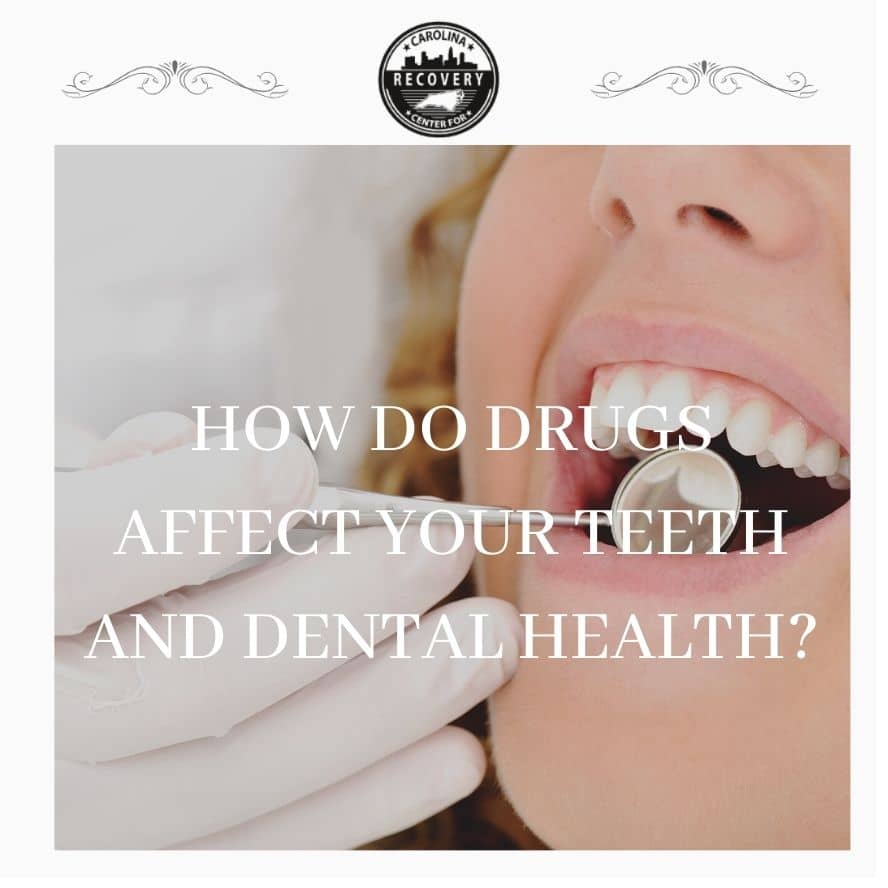How Do Drugs Affect Your Teeth and Dental Health?

Medically Verified: 2/1/24
Medical Reviewer
Chief Editor

All of the information on this page has been reviewed and verified by a certified addiction professional.
Drug addiction is a chronic and progressive condition that is known to cause an array of negative effects on an individual’s life. Any form of substance abuse can lead to financial devastation, social isolation, and life-threatening medical emergencies like overdoses and organ failures. However, there are other less talked about consequences of drug addiction that are worth mentioning.
Drug and alcohol abuse can cause devastating damage to an individual’s teeth and overall dental health. From teeth grinding to tooth decay, substance abuse can really take a toll on someone’s oral hygiene. Here are the different ways drugs affect teeth and dental health.
How Specific Types of Drugs Damage Your Oral Health
Many different types of drugs can wreak havoc on an individual’s teeth, gums, and entire mouth. Because people suffering from addiction spend the bulk of their time obtaining, using, and recovering from the effects of drugs, they might neglect important hygiene routines such as brushing their teeth or going to the dentist.
The most common ways that drugs are known to affect dental hygiene include:
- Dry mouth that causes increased acidity and loss of enamel
- Acid reflux causes the damage to the enamel and soft tissue
- Teeth grinding
- Loss of blood flow to gums and roots
- Infected ulcers and sores in the mouth
- Lack of oral hygiene care
- Nutritional deficiencies leading to tooth and gum damage
- Cravings for sugary food and beverages lead to tooth rot
Some drugs affect teeth and dental health differently than others. This is how different types of drugs damage your oral health:
Methamphetamine
Methamphetamine is notorious for causing damage to teeth and the overall decline of oral hygiene. In fact, meth causes dental health issues so frequently that people coined the term “meth mouth.”[1]
Meth causes an extremely rapid decline in oral hygiene by causing blood vessels in the gums to shrink and die. This leads to an array of problems in an individual’s gums.
Meth also causes the mouth to dry out. The lack of saliva causes other acids in the mouth to eat away at the enamel on an individual’s teeth. This is what causes tooth decay and is usually the culprit in cases of meth mouth.
Lastly, because this substance is a stimulant, it causes individuals to grind their teeth due to high levels of stress. Over time, teeth grinding can cause teeth to become worn down and even cracked.
Cocaine
The way that cocaine causes dental damage depends on how an individual consumes it. If cocaine comes in contact with someone’s teeth, the acidity of the substance will break down their enamel. This leads to tooth decay over time.
Long-term and frequent snorting of cocaine can cause a hole to form in the soft palate of the mouth. As a result, it becomes difficult to eat and talk.
When someone is under the influence of this substance, they will grind their teeth. This can cause tooth decay, cracked teeth, and even infections.
While most people snort cocaine, some people rub the powder into their gums. This can cause them to develop painful and infected sores or ulcers.
Alcohol
Alcohol is created with fermented sugars and, oftentimes, additional sugar is added later when individuals order a mixed drink. People who suffer from heavy alcohol abuse or addiction may suffer from a rapid buildup of plaque because of the high sugar content. Additionally, the acidity of alcohol can quickly cause tooth decay.[2]
It is important to note that alcohol is known to cause acid reflux. Individuals who experience frequent bouts of acid reflux are at risk of eroding the enamel on their teeth.
Additionally, many people who suffer from alcoholism do not eat full meals to experience a faster and more potent effect. This practice can lead to nutritional deficiencies, which sometimes cause tooth decay and the brittleness of teeth. People may also forget to brush their teeth while intoxicated, allowing plaque to accumulate.
Opioids
Opioid drugs like heroin sometimes make people crave sugary snacks. If an individual continually binges on foods high in sugar, their teeth will eventually rot.
According to the FDA, opioid medications that are dissolved in the mouth can lead to, “dental problems, including tooth decay, cavities, oral infections, and loss of teeth, can be serious and have been reported even in patients with no history of dental issues.”[3]
Many people addicted to opioid drugs partake in intravenous (IV) drug use. This method of administration puts individuals at an extremely high risk of developing infections, including oral fungus and viral infections that affect the mouth.
Even more concerning, opioids reduce and soothe symptoms of pain. If an individual who is addicted to opioids was suffering from tooth decay or cavities, they might not notice any signs of tooth pain.
Tobacco and Marijuana
Tobacco, marijuana, and any other substance that can be smoked may cause individuals to develop oral cancer. It is important to note that chewing tobacco puts individuals at an increased risk of oral cancer.
Other risks of smoking tobacco and marijuana include:
- Dry mouth
- Halitosis
- Gingivitis
- Damage and rotting of teeth
- Periodontal gum disease
Finding Help for Alcoholism and Drug Addiction
Substance use disorder can affect you or your loved one’s life in a variety of ways, including providing you with an extremely expensive dental bill. To avoid sustaining life-changing damage to your gums, teeth, and entire mouth, consider attending an addiction treatment program.
At Carolina Recovery Center, we provide our patients with all of the resources they need to recover from addiction and maintain lifelong sobriety. Contact us today for more information on our drug and alcohol recovery programs.
References:

